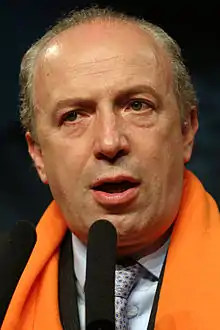Coalition PSD/CDS Coligação PSD/CDS | |
|---|---|
 | |
| Abbreviation | PPD/PSD.CDS-PP (official) |
| Leader | Luís Montenegro Nuno Melo |
| Founded | 1997 (just the two parties) 1979 (Democratic Alliance along PPM) |
| Ideology | Conservatism Liberal conservatism Christian democracy |
| Political position | Centre-right[1] to right-wing[2] |
| European affiliation | European People's Party |
| International affiliation | Centrist Democrat International International Democrat Union |
| European Parliament group | European People's Party |
| Member parties | Social Democratic Party CDS – People's Party |
The PSD/CDS coalition (Portuguese: Coligação PSD/CDS, PPD/PSD.CDS-PP) is a recurring conservative[3] political and electoral alliance in Portugal formed by the Social Democratic Party (PPD/PSD) and CDS – People's Party (CDS-PP).
Though the history of coaltion between the two parties stretches back over 40 years, the parties have not run together in most elections and, when they did so, they always retained their own autonomous parliamentary groups afterwards.
History
PSD and CDS were founded after the 1974 Revolution that overthrew the Estado Novo dictatorship.
Both parties have had a close affinity for the most part of their existence. Previous to any electoral alliance, they both endorsed the same presidential candidate in the first democratic presidential election of 1976, Ramalho Eanes, who also had the backing of the Socialist Party.
The first time the two parties were together in a coalition was in the general and local elections of 1979, under the Democratic Alliance banner, albeit along with the People's Monarchist Party and the Reformers, a small group of Socialist Party dissidents. This first continuous coalition lasted until 1983 and run a total of two general elections (1979 and 1980) and two local elections (1979 and 1982). Both parties endorsed again a single candidate in the 1980 and 1986 presidential eletions.
The coalition with just the two parties appeared for the first time in the 1997 local elections and, at the local level, it has been expanded in each following election till today, holding, as of 2021, 31 mayors out of 308 municipalities in the country.
The coalition was on the ballot in the 2004 Azores regional election, as Coalition Azores (Portuguese: Coligação Açores, CA).but failed to win that election. The coalition was also on the ballot in the 2023 Madeira regional election, as We are Madeira (Portuguese: Somos Madeira, SM). The coalition has been on the ballot in two European Parliament elections, 2004 as Forward Portugal (Portuguese: Força Portugal, FP), and 2014 as Portugal Alliance (Portuguese: Aliança Portugal, AP).
On elections for the Assembly of the Republic, the coalition was only tried once, in the 2015 legislative election, as Portugal Ahead (Portuguese: Portugal à Frente, PàF). and it polled ahead with almost 39% of the votes, but was unable to remain in power as it didn't gain enough seats for a majority. In the Presidential elections, the candidates supported by a PSD/CDS coalition have won every single election since 2006.
Election results
Assembly of the Republic
2015 legislative election


For the 2015 legislative election, PSD and CDS-PP ran under a coalition with the name Portugal Ahead. In the legislative election on 5 October 2015, the PSD/CDS-PP joint list received 36.9% of the vote and returned 102 seats in the Assembly of the Republic, with the PSD electing 5 deputies on standalone lists in Madeira and Azores.[4]
Although the coalition won the elections, and surprised many analysts and pundits, the left parties together had a majority in Parliament, and opted to negotiate a confidence-and-supply agreement, thus refusing to allow for a second PSD/CDS-PP cabinet. For the first time in Portuguese democracy the Socialist Party, the second most voted political force in the elections, negotiated with the BE, the PCP and the PEV a formation of a new government.
Following the fall of the short-lived 20th Constitutional Government, the "natural" extinction of the coalition was declared on 16 December 2015 by Passos Coelho: "No formal act is necessary to put an end to it".[5][6]
| Election | Coalition name | Leader | Votes | % | Seats | Government |
|---|---|---|---|---|---|---|
| Countrywide coalitions | ||||||
| 2015 | Portugal Ahead | Pedro Passos Coelho | 2,085,465 | 38.6 (#1) | 107 / 230 |
Coalition[lower-alpha 1] |
| Opposition | ||||||
| 2024 | Democratic Alliance[lower-alpha 2] | Luís Montenegro | TBD | TBD | TBD | TBD |
| Coalitions in some districts | ||||||
| 2022 | All, in coalition and separately[lower-alpha 3] | Rui Rio | 1,707,456 | 30.69 (#2) | 77 / 230 |
Opposition |
| Madeira First (Madeira) | 50,634 | 39.83 (#1) | 3 / 6 | |||
| Democratic Alliance[lower-alpha 2] (Azores) | 28,520 | 33.92 (#2) | 2 / 5 | |||
European Parliament
2004 European Parliament election
As Forward Portugal (Força Portugal, FP)
| Election | Leader | Votes | % | Seats |
|---|---|---|---|---|
| 2004 | João de Deus Pinheiro | 1,132,769 | 33.3 (#2) | 7 / 21 |
2014 European Parliament election
An alliance was formed as the Portugal Alliance (Aliança Portugal) for the 2014 European Parliament election, in which the alliance won 27.7% of the popular vote and 7 of Portugal's 21 seats in the European Parliament, sitting with the European People's Party Group.[7]
As Portugal Alliance (Aliança Portugal, AP)
| Election | Leader | Votes | % | Seats |
|---|---|---|---|---|
| 2014 | Paulo Rangel | 910,647 | 27.7 (#2) | 7 / 21 |
Regional Assemblies
2004 Azores regional election
As Azores Coalition (Coligação Açores, CA)
| Election | Leader | Votes | % | Seats | Government |
|---|---|---|---|---|---|
| 2004 | Victor do Couto Cruz | 38,883 | 36.8 (#2) | 21 / 52 |
Opposition |
2023 Madeira regional election
As We are Madeira (Somos Madeira, SM)
| Election | Leader | Votes | % | Seats | Government |
|---|---|---|---|---|---|
| 2023 | Miguel Albuquerque | 58,394 | 43.1 (#1) | 23 / 47 |
Coalition[lower-alpha 4] |
Local elections
Only in contests where PSD and CDS-PP ran in a joint coalition.
| Election | Votes | % | Councillors | +/- | Mayors | +/- | Assemblies | +/- | Parishes | +/- |
|---|---|---|---|---|---|---|---|---|---|---|
| 1997 | 124,859 | 2.3 (#6) | 7 / 2,021 |
New | 0 / 305 |
New | 22 / 6,807 |
New | 561 / 33,953 |
New |
| 2001 | 472,581 | 9.0 (#4) | 114 / 2,044 |
15 / 308 |
427 / 6,876 |
2,124 / 34,569 |
||||
| 2005 | 462,199 | 8.6 (#4) | 131 / 2,046 |
18 / 308 |
407 / 6,885 |
2,065 / 34,498 |
||||
| 2009 | 540,053 | 9.8 (#3) | 157 / 2,078 |
19 / 308 |
522 / 6,946 |
2,911 / 34,498 |
||||
| 2013 | 379,110 | 7.6 (#4) | 154 / 2,086 |
16 / 308 |
493 / 6,487 |
2,096 / 27,167 |
||||
| 2017 | 454,222 | 8.8 (#4) | 169 / 2,074 |
16 / 308 |
539 / 6,461 |
2,486 / 27,005 |
||||
| 2021 | 540,783 | 10.8 (#3) | 239 / 2,064 |
31 / 308 |
751 / 6,448 |
3,210 / 26,790 |
Presidential elections
The table below shows the electoral results[8] of presidential candidates who were endorsed by both parties, besides endorsements by other parties.
| Election | Candidate | 1st round | 2nd round | ||
|---|---|---|---|---|---|
| Votes | % | Votes | % | ||
| 1976 | António Ramalho Eanes | 2,967,414 | 61.54 (#1) | – | – |
| 1980 | António Soares Carneiro | 2,319,847 | 40.21 (#2) | – | – |
| 1986 | Diogo Freitas do Amaral | 2,628,178 | 46.31 (#1) | 2,864,728 | 48.72 (#2) |
| 1996 | Aníbal Cavaco Silva | 2,606,236 | 46.17 (#2) | – | – |
| 2001 | Joaquim Ferreira do Amaral | 1,493,858 | 34.54 (#2) | – | – |
| 2006 | Aníbal Cavaco Silva | 2,746,689 | 50.59 (#1) | – | – |
| 2011 | 2,231,603 | 52.95 (#1) | – | – | |
| 2016 | Marcelo Rebelo de Sousa | 2,411,925 | 52.0 (#1) | – | – |
| 2021 | 2,534,745 | 60.7 (#1) | – | – | |
Leaders


| Date (start of term) |
PSD | CDS-PP | ||
|---|---|---|---|---|
| 22 March 1992 | Manuel Monteiro | |||
| 29 March 1996 |  |
Marcelo Rebelo de Sousa | ||
| 22 March 1998 | .png.webp) |
Paulo Portas | ||
| 1 May 1999 |  |
José Durão Barroso | ||
| 30 June 2004 |  |
Pedro Santana Lopes | ||
| 10 April 2005 | .png.webp) |
Luís Marques Mendes | ||
| 24 April 2005 | .png.webp) |
José Ribeiro e Castro | ||
| 21 April 2007 | .png.webp) |
Paulo Portas | ||
| 28 September 2007 |  |
Luís Filipe Menezes | ||
| 31 May 2008 | _(cropped).jpg.webp) |
Manuela Ferreira Leite | ||
| 26 March 2010 | .jpg.webp) |
Pedro Passos Coelho | ||
| 13 March 2016 | .jpg.webp) |
Assunção Cristas | ||
| 18 February 2018 | _(cropped%252C_Rui_Rio).jpg.webp) |
Rui Rio | ||
| 25 January 2020 | .jpg.webp) |
Francisco Rodrigues dos Santos | ||
| 2 April 2022 |  |
Nuno Melo | ||
| 3 July 2022 |  |
Luís Montenegro | ||
Notes
- ↑ Minority government (2015); Opposition (2015–2019).
- 1 2 The Democratic Alliance includes the People's Monarchist Party.
- ↑ PSD and CDS ran in coalition in only two constituencies: Azores (along with PPM) and Madeira (just the two). Nationwide, PPM only ran by itself in one constituency, Madeira, where it got 260 votes. These isolated PPM votes are not taken into account because they are not related to PSD or CDS candidacies.
- ↑ Coalition government Social Democratic Party-CDS–PP; Confidence & supply gov't: PSD/CDS-PP ⇐ (PAN).
See also
References
- ↑ "Portugal election: centre-right coalition retains power but could lose majority". The Guardian. Reuters. 5 October 2015.
- ↑ "Portugal parliamentary election 2019: Who are the main parties?" Euronews. 5 October 2019.
- ↑ Nordsieck, Wolfram (2015). "Portugal". Parties and Elections in Europe. Archived from the original on 18 October 2015.
- ↑ "Legislativas 2015 - Resultados Globais". Archived from the original on 2015-10-16. Retrieved 2015-10-05.
- ↑ (16 December 2015) Passos Coelho diz que a coligação "acabou" TSF. Retrieved 25 December 2015.
- ↑ (16 December 2015) Passos: Coligação com CDS acabou Expresso. Retrieved 25 December 2015.
- ↑ "Results by country: Portugal". Results of the 2014 European elections. European Parliament. Retrieved 28 May 2014.
- ↑ "Resultados Eleitorais". Secretaria-Geral do Ministério da Administração Interna. Retrieved 7 January 2024.
External links
- Official website (Portuguese)